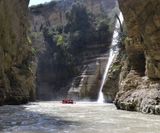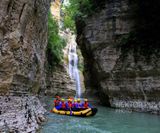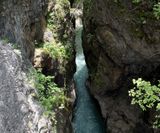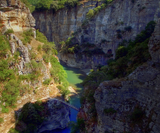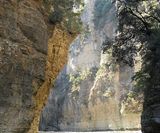Albania’s regulatory and fiscal hydrocarbons regime
Part of Report: Albania’s Oil and Gas Sector Development
Hasan Cerhozi | Friday, September 4, 2015
The regulatory regime
Albania introduced its first legislation for hydrocarbons back in the 90s along with the country’s commence of transition towards liberal democracy. In a decade (1989 -1998), Albania held three licensing rounds for petroleum exploration. Today’s contractual status consists of nine PSA’s with foreign independent oil companies while the production rates do not resemble at all those of the mid 70s with current production being at 21,000b/d, mostly heavy oil from the Patos – Marinza. On the other side natural gas production is insignificant at 13 thousand tons of oil equivalent (ktoe) in 2012.
Petroleum Exploration, Development and Production in Albania is regulated by three main laws: a) “Petroleum Law (Exploration and Production)”, No. 7746 dated 28 July 1993 as amended, b) the Law 7811 dated 12 April 1994 “On the Fiscal System in the Hydrocarbons Sector (Exploration and Production)” as amended, and c) the Law No. 9975, dated 28.07.2008 “On the National Taxes”. The current legal framework has been clearly drafted to provide considerable flexibility to both the government and the producing companies and also incentivize investments in oil exploration and production activities.
According to the “Petroleum Law” all petroleum deposits existing in their natural condition within the jurisdiction of the Albanian state are the exclusive property of the Albanian State. The law authorizes the Ministry of Industry and Energy to enter into a Petroleum Sharing Agreement with an oil company to which exclusive rights for exploration and production can be granted.
In Albania’s effort to become an attractive destination for IOC’s the creation of a one “stop shop” institution was necessary. In 2006 the Council of Ministers decided the creation of the AKBN (National Agency of Natural Resources). As a state institution the agency is attached to the Ministry of Energy and Industry (MEI) and is responsible with monitoring and regulating the upstream oil and gas industry. The AKBN is not an independent hydrocarbon focused regulatory agency, which is the case in other countries, but has a larger portfolio including minerals and hydropower. Nevertheless the AKBN does function as a one stop shop institution since any interested entity has to submit its application for the rights of a Block to AKBN and the latter submits it to MEI.
For certain blocks that are under Albpetrol’s administration, the same procedure is followed by Albpetrol which is also able to enter in a joint operation agreement. However, the final draft of the agreement either negotiated by the AKBN either by Albpetrol has to be submitted for approval to the MEI and then in case that the MEI judges it necessary it might also be sent for consultation to the Ministry of Finance and the Ministry of Justice. Finally, the draft agreement has to be certified by the Council of Ministers. It has to be mentioned that any later change of the terms in the agreement signed due to a request for renegotiations has to be approved once again by the Council of Ministers, which de facto is the institutional body holding the supreme authority. Nevertheless, contrary to what exists in other oil producing countries, the Albanian regulatory regime does not require for the PSA to be discussed and seek approval in the parliament.
Before entering into the details it is necessary to clarify that there is only one type of contract offered by the Petroleum Law, that of a Production Sharing Agreement (PSA). There is also the option of applying for a Reconnaissance Permit, however the holder of that Permit can only perform seismic exploration activities in the area covered by the Permit for a period of two years while he is not authorized to drill any exploration wells. Also, this specific permit does not confer on the holder a preferential right to lately enter into a PSA with MEI.
The mainstream procedure ordains the announcement of free blocks by the MEI and the call for applications. Any interested entity should apply to AKBN or else to Albpetrol for blocks that are under Albpetrol’s administration. Certain application deadlines are appointed by MEI to each block or group of blocks.
The PSA offered by the Albanian government is quite flexible and can offer very competitive terms since not all terms are strictly predetermined, but are subject to negotiations between the interested party and the AKBN or Albpetrol respectively. Nevertheless the exploration period is set at 5 years which can be extended up to 7 years, while in case of commercial discovery the period for development and production is 25 years, with possible extension depending on the circumstances.
The Albanian upstream hydrocarbons regulatory system does not provide a model contract designed for each area (onshore or offshore) and/or each quality of crude, hence it demands the company which files the application to propose the main terms of the agreement with respect to the major aspects of the PSA model as defined in the Petroleum Law. Almost all terms are open to negotiation (see table 1). The basis for the negotiations of these terms are not disclosed but the type of the specifics of the field, the quality of the crude and the oil price of international benchmarks are definitely some of the main points.
Despite the fact that AKBN is entitled with the representation of the Ministry, when the negotiations take place, by order of the Minister representatives of the MEI and external experts can be appointed to take part in the negotiating group.
Of course, under the PSA despite the signature bonus a production bonus is paid in various stages down the way. The signature and production bonus can vary depending on the type of block and type oil they are subject to negotiation.
Finally, it’s worth mentioning that since the collapse of the communist regime and the opening of the country in the early 90’s the economic model of Albania is based on foreign investments, hence the country has adopted a series of measures to strengthen the feeling of security to international investors. Foreign investors in the upstream petroleum sector are fully protected by the law. In case that a company decides to go for international arbitration then the arbitration shall be in accordance with UNCITRAL arbitration rules and preferably under English Law. However, the road so far has not been all smooth for foreign investors since there has been a case were the AKBN has cancelled a PSA as it was the case with Sky Petroleum which in December 2011 proceeded with international arbitration against MEI and AKBN.
The fiscal regime
Upstream petroleum companies in Albania, as it happens in many producing countries, are subject to a fixed corporate income tax or as it is commonly named a profit tax. The oil and gas companies are obliged to pay a 50% tax on their profit depending the quantity produced which can be characterized as a relatively moderate amount when compared to what is applied in other countries.
In case that the contractor is Albpetrol or Albpetrol is part of a consortium holding a higher than 50% interest in the agreement then the profit tax is calculated as illustrated in table 2 can vary from 30% to 55%.
The Right of Pre-Existing Production is Albpetrol’s right to obtain 65 – 80% percentage of the average production realized in the last 6 months from wells transferred to the contractor. The exact percentage is negotiated and agreed between Albpetrol and the contractor. This percentage has an annual decrease from 5% – 15%. The contractor is not obliged to provide this percentage if Albpetrol does not does not require to do so, since by definition this is a right that Albpetrol has and not a predetermined obligation.
Under all Petroleum Sharing Agreements the contractor during the period that is recovering its costs, must transfer a portion of the oil produced to Albpetrol. The part transferred to Albpetrol which is called as “Albpetrol Share” is calculated according an R factor which varies accordingly to each agreement from 1% to - 5% of the available petroleum. For example if R=2 then the Alpbetrol Share is 5%. Concerning natural gas depending on the R factor the Albpetrol share fluctuates at much smaller percentage ranging from 0% to 0.5%.
Last but not least, except from the Albpetrol Share the contractors are obliged to transfer to Albpetrol another oil portion after deducting their investments. This is a particular provision which is named “Profit Petroleum” and it is enforced only on some specific fields.
The Law No.9975, dated 28.7.2008 on “National Taxes” provides the application of the Mining Tax or else the Royalty. The royalty rate applied in Albania, has no particularities, the contractor must pay a royalty of 10% of the revenues from the sales of petroleum. Albpetrol even though is a state company is also obliged to pay royalties to the state.
The method of payment can vary as the AKBN which is also responsible to collect the royalties and takes the governments tax and or/its share of profit in cash either in kind or even in both forms depending on the PSA.
New fiscal provisions
The fact that the PSAs are not approved by the Parliament means that any changes to the fiscal legislation can directly affect the contractors. Since 2014 though, the newly elected government undertook a fiscal reform which also touched on the upstream hydrocarbons sector. The aim was to some extent reorient the fiscal environment for hydrocarbons. The VAT exemption on imports of petroleum by products was lifted from the goods and services needed in the development phase but it was maintained for the exploration phase as the government realizes the higher risks associated with this phase.
Also, an excise tax was introduced on the imports of petroleum byproducts, used in both exploration and development phases. The income of foreign individuals realized from hydrocarbon operation ended its tax free regime and also became subject to Albania’s tax legislation. Moreover, the contractor and its subcontractors were exempted from custom obligations in importing equipment, machinery and any material that is used in exploration and production activities. Nevertheless the right of the oil companies to export capital earned from hydrocarbon activities in any currency of their preference was maintained tax free while no rental fee for land which is under the state’s ownership and where exploration or production activities take place was imposed.
The challenges ahead
All in all, Albania has indeed an attractive fiscal and contractual regime. The creation of AKBN was a big step towards the constitution of a functional institutional framework. However there is still a lot of work to be done in a number of issues.
The current legislation on profit tax needs to be updated while administrative guidelines need to be adopted to as to avoid misalignments between the AKBN and the tax authorities. Moreover, in Albania there are does not exist a Local Content Act. The contribution of the extractive industries as a whole (oil, gas and mining) can be characterized as insignificant since it counts for less than 1% of the total employees in the country.
Environmental protection and conservation is another issue that needs to be dealt with. There is no clear regulation or environmental standards governing the sector however it is highly possible that strict regulations tackling these issues will be adopted soon since the country is a member of the Energy Community and is moving forward on its path towards EU integration.
Finally, the obsolete infrastructure for both oil and gas transportation is another challenge, as up until today most of transportation is done by truck. This though is expected to change in the long term since the new discovery of light crude oil in the Molisht-2 Blocks 2-3 from Shell and Petromanas coupled with the selection and the commence of the construction of the Trans Adriatic Pipeline has brought a lot of international attention to the country. Plans for the gasification of the country are being drafted and discussed foreshadowing that new heavy investments will take place in infrastructure.
For the full report click here.
The network of the ACERC partners, supporters and sponsors include among others
For more about visit the dedicate section












